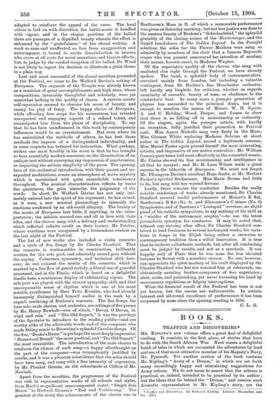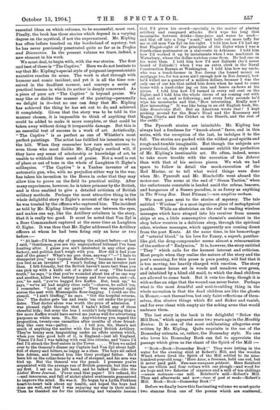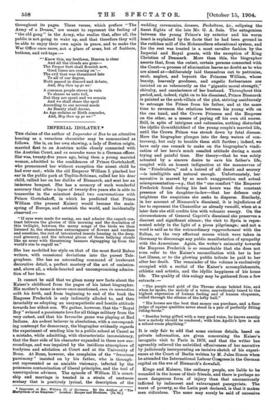BOOKS.
TRAFFICS AND DISCOVERIES.*
MR. KIPLING'S new volume offers a great deal of delightful reading. It consists, in the first place, of stories that have to do with the South African War. Next comes a delightful batch of tales in which are recounted the adventures by land and sea of that most attractive member of his Majesty's Navy, Mr. Pyecroft. Yet another section of the book Contains Mr. Kipling's "Army of a Dream," in which are set forth many exceedingly happy and stimulating suggestions for Army reform. We do not mean to assert that the scheme is practical, or, indeed, intended to be practical by its author ; but the ideas that lie behind the "Dream," and receive such dramatic representation in Mr. Kipling's story, are the * Traffics and Discoveries. By Eudyard Iiipling. London Macmillan and co. Css..1 essential ideas on which reforms, to be successful, must rest. Finally, the book has three stories which depend in a varying degree on the mystical, if not the supernatural. Mr. Kipling has often before touched on the borderland of mystery, but he has never previously penetrated quite so far as in Traffics and Discoveries. In the present volume we trace, indeed, a
new element in his work.
We must deal, to begin with, with the war stories. The first and best of these is "The Captive." Here we do not hesitate to say that Mr. Kipling's special style of poignant impressionistic narrative reaches its acme. The work is shot through with humour and comic incident, and yet it is all the time con- ceived in the deadliest earnest, and conveys a series of practical lessons in which its author is deeply concerned. As a piece of pure art "The Captive" is beyond praise. We may like or dislike the manner of the painting—personally we delight in it—but no one can deny that Mr. Kipling
has achieved the thing he has set out to do, and achieved it completely. Given that the story was to be told in the
manner chosen, it is impossible to think of anything that could be added to make it more complete, or that could be taken away without doing it irreparable damage. But this is an essential test of success in a work of art. Artistically, "The Captive" is as perfect as one of Whistler's most perfect paintings. The artist has fulfilled his intention up to the hilt. When they remember how rare such success is, even those who most dislike Mr. Kipling's method will, if they have any sense of scholarship or knowledge of art, be unable to withhold their meed of praise. Not a word is out of place or out of tone in the whole of Laughton 0. Zigler's soliloquies. "The Captive" is a Yankee inventor of an automatic gun, who, with no prejudice either way in the war, has taken his invention to the Boers in order that they may allow him to prove on the field its practical utility. After many experiences, however, he is taken prisoner by the British, and is thus enabled to give a detailed criticism of British military methods. Perhaps the most attractive thing in the whole delightful story is Zigler's account of the way in which he was treated by the officers who captured him. The incident as told by Mr. Kipling literally smites one between the eyes, and makes one say, like the Artillery subaltern in the story, that it is really too good. It must be noted that Van Zyl is a Boer Commandant captured at the same time as Laughton 0. Zigler. It was thus that Mr. Zigler addressed the Artillery officers at whom he had been firing only an hour or two
" At last—I'd been shy of opening the subject before—at last I said, "Gentlemen, you are the unprejudiced tribunal I've been hunting after. I guess you ain't interested in any other gun- factory, and politics don't weigh with you. How did it feel your end of the game ? What's my gun done, anyway ? "—"I hate to disappoint you," says Captain Mankeltow, "because I know how you feel as an inventor." I wasn't feeling like an inventor just then. I felt friendly, but the British haven't more tact than you can pick up with a knife out of a plate of soup. "The honest truth," he says," is that you've wounded about ten of us one way and another, killed two battery horses and four mules, and—oh, yes," he said, "you've bagged five Kaffirs. But, buck up," he says," we've all had mighty close calls "—shaves, he called 'em, I remember. "Look at my pants." They was repaired right across the seat with Minneapolis flour-bagging. I could see the stencil. "I ain't bluffing," he says. "Get the hospital returns, Doc." The doctor gets 'em and reads 'em out under the proper dates. That doctor alone was worth the price of admission. I was pleased right through that I hadn't killed any of these cheerful kids ; but none the less I couldn't help thinking that a few more Kaffirs would have served me just as well for advertising purposes as white men. No, Sir. Anywhichway you regard the proposition, twenty-one casualties after months of close friend- ship like ours was—paltry I tell you, Sir, there's not much of anything the matter with the Royal British Artillery. They're brainy men languishing under an effete system which, when you take good holt of it, is England—just all England. 'Times I'd feel I was talking with real live citizens, and 'times I'd feel I'd struck the Beef-eaters in the Tower When we sailed over to the General's dinner my Captain had Van Zyl about half- full of sherry and bitters, as happy as a clam. The boys all called him Adrian, and treated him like their prodigal father. He'd been hit on the collar-bone by a wad of shrapnel, and his arm was tied up. But the General was the peach. I presume you're acquainted with the average run of British generals, but this was my first. I sat on his left hand, and he talked like—like the Ladies' Home Jour-sal. 'Tever read that paper ? It's refined, Sir —and innocuous, and full of nickel-plated sentiments guaranteed to improve the mind_ He was it. He began by a Lydia Pinkham heart-to-heart talk about my health, and hoped the boys had done me well, and that I was enjoying my stay in their midst. Then he thanked me for the interesting and valuable lessons
that I'd given his crowd—specially in the matter of placing artillery and rearguard attacks. He'd wipe his long thin moustache between drinks—lime-juice and water he used— and blat off into a long "a-ash," and ladle out more taffy for me or old man Van Zyl on his right. I told him how I'd had my first Pisgah-sight of the principles of the Zigler when I was a fourth-class postmaster on a star-route in Arkansas. I told him how I'd worked it up by instalments when I was machinist in Waterbury, where the dollar-watches come from. He had one on his wrist then. I told him how I'd met Zalinski (he'd never heard of Zalinski !) when I was an extra clerk in the Naval Construction Bureau at Washington. I told him how my uncle, who was a truck-farmer in Noo Jersey (he loaned money on mortgage too, for ten acres ain't enough now in Noo Jersey), how he'd willed me a quarter of a million dollars, because I was the only one of our kin that called him down when he used to come home with a hard-cider jag on him and heave ox-bows at his nieces. I told him how I'd turned in every red cent on the Zigler, and I told him the whole circus of my coming out with her, and so on, and so following ; and every forty seconds he'd wipe his moustache and blat, "How interesting. Really now ? How interesting." It was like being in an old English book, Sir. Like Bracebridge Hall. But an American wrote that! I kept peeking around for the Boar's Head and the Rosemary and Magna Charta and the Cricket on the Hearth, and the rest of the outfit." '
The Pyecroft stories are inimitable. Mr. Kipling has always had a fondness for " knock-about " farce, and in this series, with the exception of the last, he indulges it to the full. The stories are packed with the wildest good spirits and rough-and-tumble imaginable. But though the subjects are purely farcical, the style and manner exhibit the perfection of Mr. Kipling's inestimable art. He often, indeed, seems
to take more trouble with the execution of his Scherzi than with that of his serious pieces. We wish we had space to follow in detail the mock-execution of the
Red Marine, or to tell what weird things were done when Mr. Pyecroft and Mr. Hinchcliffe went aboard the
motor-car. The scene at the end of " Steam Tactics," when the unfortunate constable is landed amid the zebras, beavers, and kangaroos of a Sussex paradise, is as funny as anything in The Wrong Box. Dent Pitman !—non atnplius verbum.
We must pass next to the stories of mystery. The tale entitled "Wireless" is a most ingenious piece of metaphysical parable. While an electrician on the roof is reading wireless messages which have strayed into his receiver from unseen ships at sea, a little consumptive chemist's assistant in the shop below receives in a delirious sleep, through the spiritual ether, wireless messages, which apparently are coming direct from the poet Keats. At the same time, in his hemorrhage of "arterial blood," in his love for Fanny, a superb, panther- like girl, the drug-compounder seems almost a reincarnation of the author of " Endymion." It is, however, the story entitled " They " which calls for the keenest interest and miticism. Most people when they realise the nature of the story and the poet's meaning, for this prose is pure poetry, will feel that it is too moving, too heavily charged with emotion. The story is of a manor house set in woods and meadows ever green, and inhabited by a blind old maid, to which the dead children are allowed to come back. But it cuts too deep, though it is with so fine an edge that the wound can never fester. Perhaps what is the most dreadful and soul-troubling thing in the whole narration is that the dead children are like the ghosts in Homer,—not themselves, but only faint reflections of them- selves, dim elusive things which flit and flicker and vanish, and for ever cheat with empty air the aching arms that would embrace them.
The last story in the book is the delightful "Below the
Mill Dam," which appeared some two years ago in the Monthly Review. It is one of the most exhilarating allegories ever written by Mr. Kipling. Quite exquisite is the use of the
Domesday extracts, or, rather, the Domesday style. No one who loves his Domesday Book can fail to appreciate the passage which gives us the chant of the Spirit of the Mill
Book—Book—Domesday Book ! ' They were letting in the water for the evening stint at Robert's Mill, and the wooden Wheel where lived the Spirit of the Mill settled to its nine- hundred-year-old song: 'Here Azor, a freeman, held one rod, but it never paid geld. Nun-nun-nunquam geldavit. Here Reinbert has one villein and four cotters with one plough—and wood for six hogs and two fisheries of sixpence and a mill of ten shillings 'no/Muni—one mill. Reinbert's mill—Robert's Mill. Then and afterwards and now—tune at post at modo—Robert's Mill. Book—Book—Domesday Book !' " Before we finally leave this fascinating volume we must quote two stanzas from one of the poems which are scattered.,
throughout its pages. These verses, which preface "The Army of a Dream," are meant to represent the feeling of "the old gang" in the Army, who realise that, after all, the public is not going to wake up, and that therefore they will be able to enjoy their own again in peace, and to make the War Office once more, not a place of arms, but of feathers, buttons, and red-tape :— '"Know this, my brethren, Heaven is clear
And all the clouds are gone— The Proper Sort shall flourish now,
Good times are coming on '— The evil that was threatened late To all of our degree, Huth passed in discord and debate,
And, Hey then up go we !
A common people strove in vain To shame us unto toil, But they are spent and we remain
And we shall share the spoil According to our several needs
As Beauty shall decree,
As Age ordains or Birth concedes, And, Hey then up go we !"












































 Previous page
Previous page